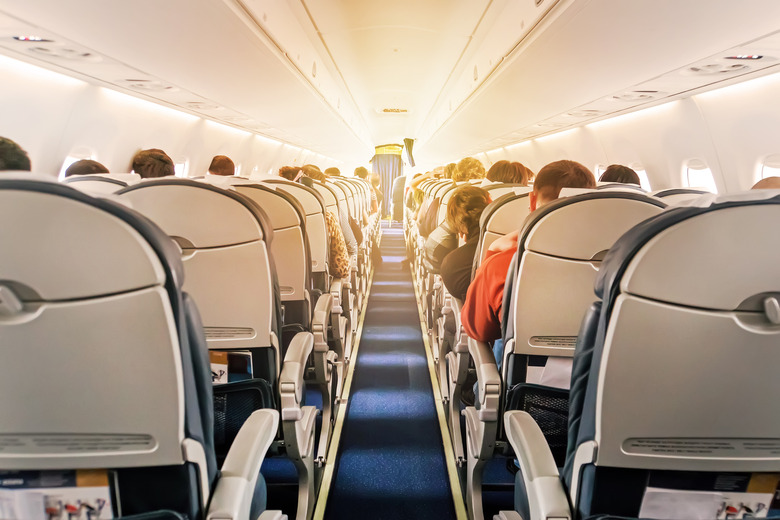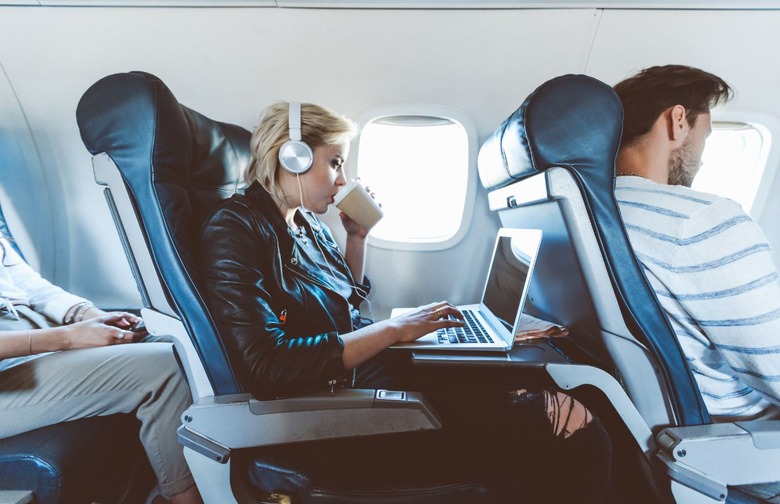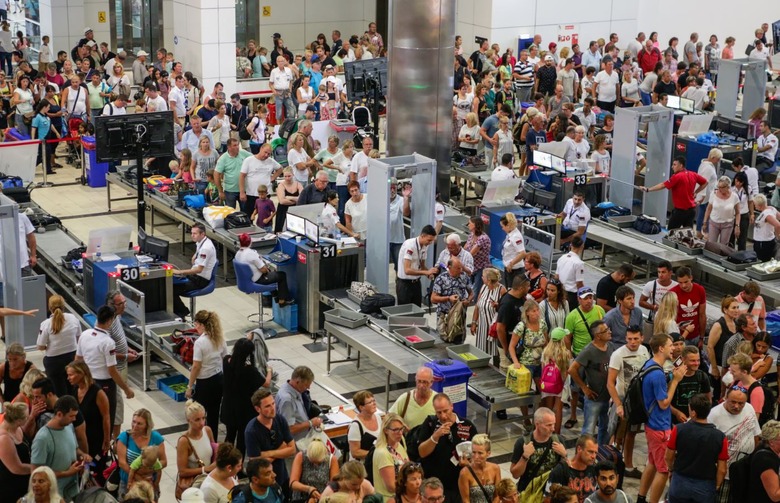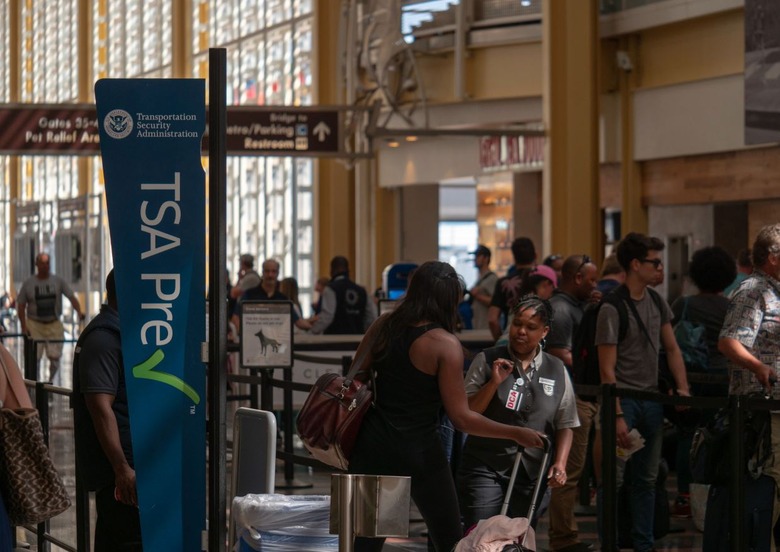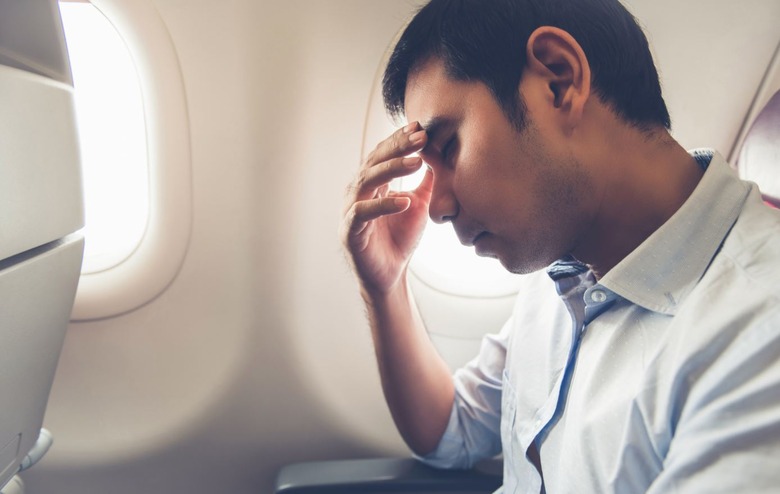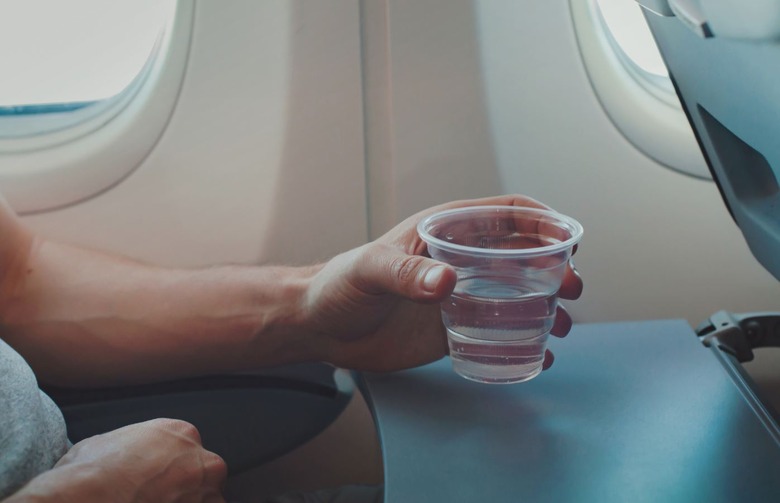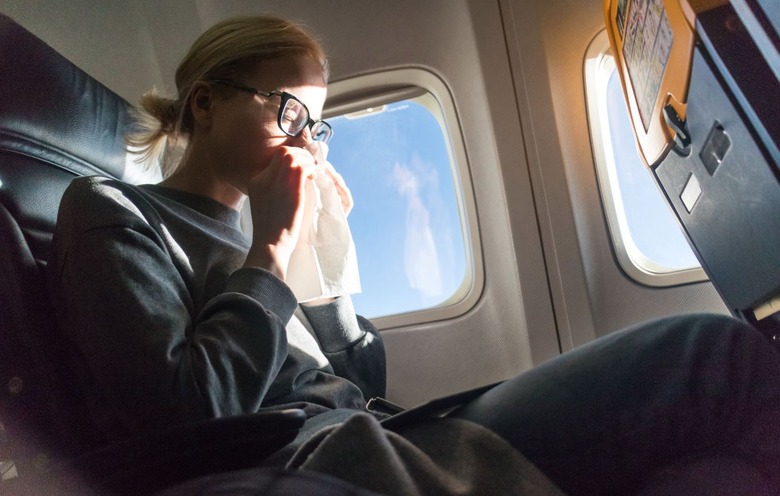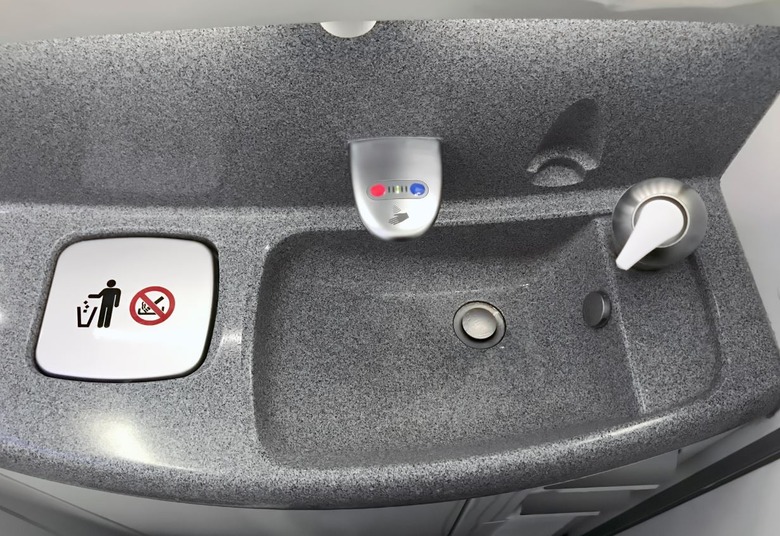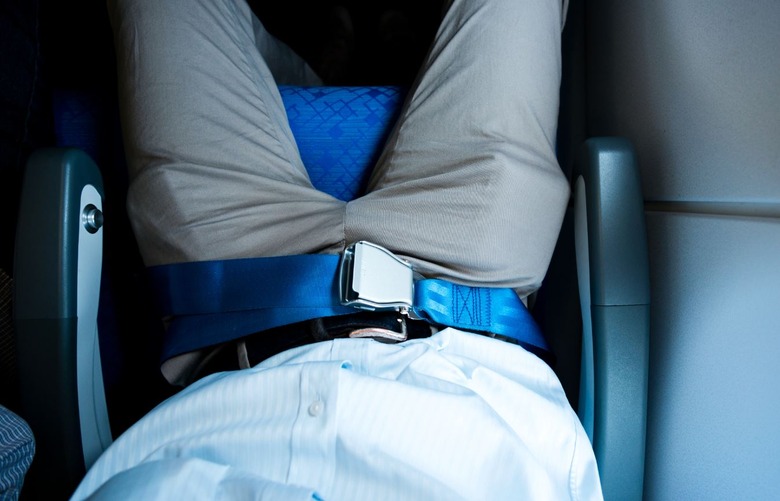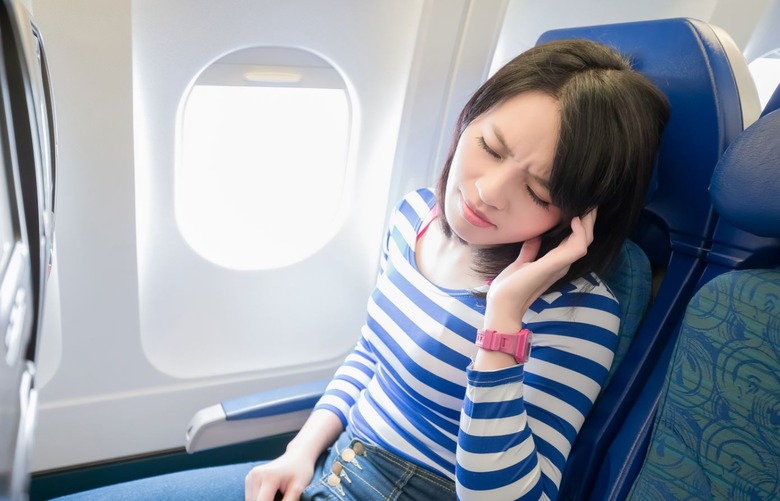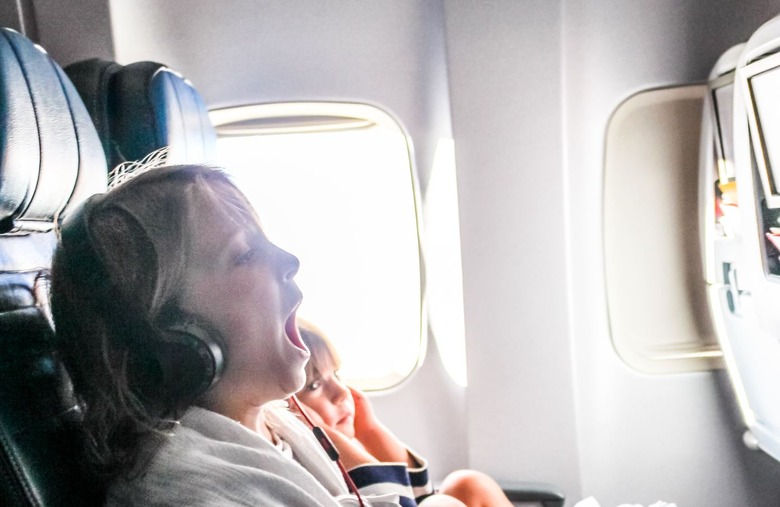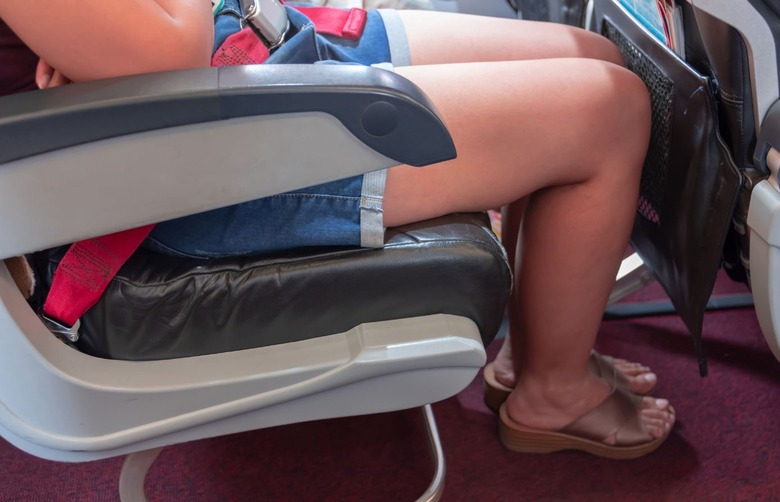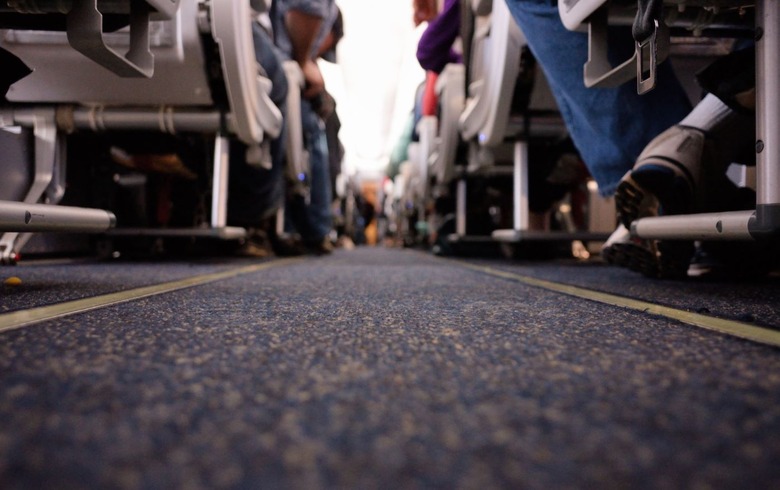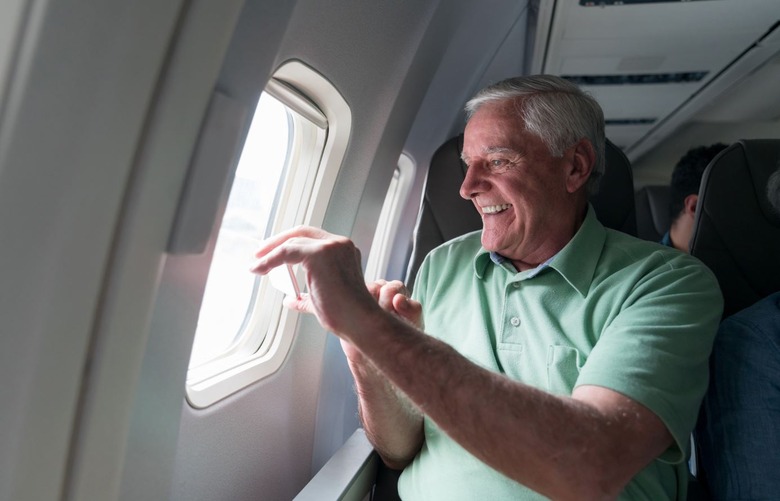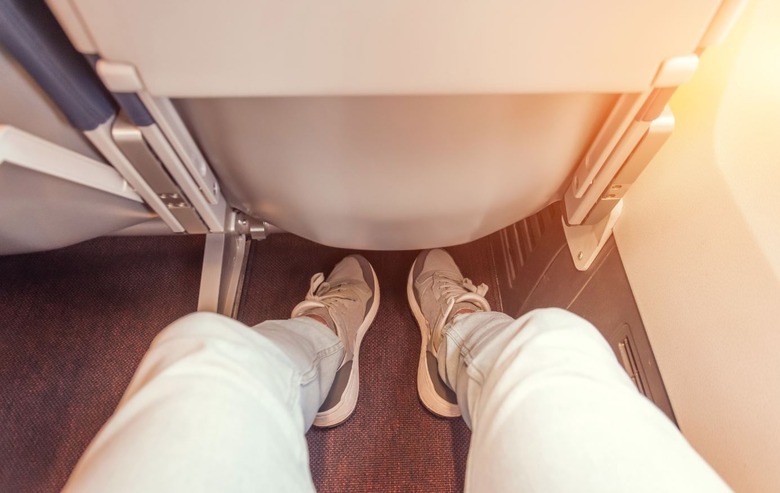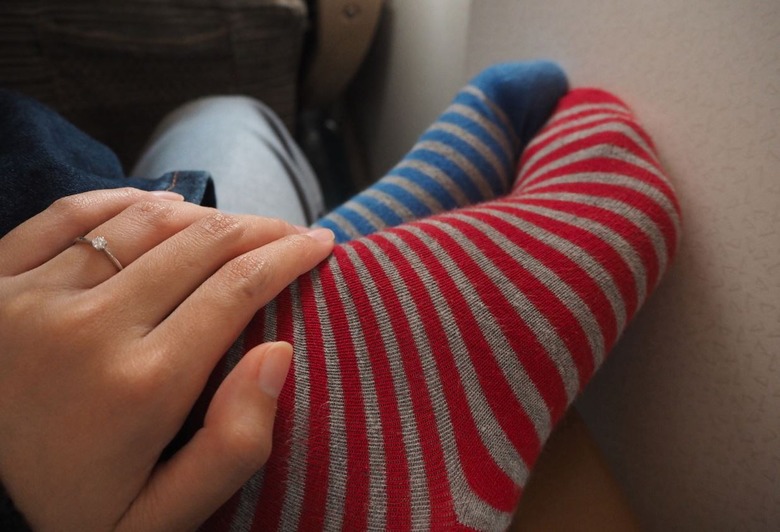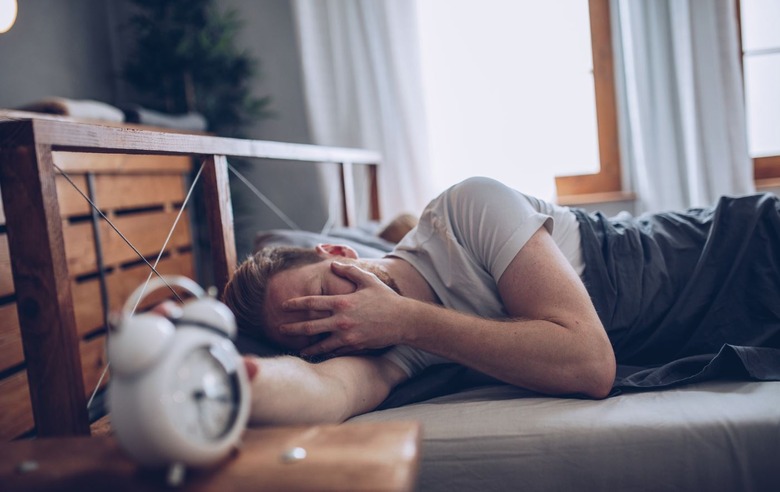Ways That Long Flights Can Affect Your Health
Whether you're checking bucket-list places off your list or flying across the country for a business meeting, long flights are a necessary evil. Unless you have the luxury of relaxing in business class, lengthy flights usually mean spending hours upon hours holed up in a small seat with minimal legroom and (if you made one of these classic flight-booking mistakes) maybe even a middle seat right by the bathrooms. Flights that last longer than three hours are more than just obnoxious — they also affect your health.
Here are the ways that flying can mess with your body and the best ways to overcome them.
You get dehydrated
When we're on an airplane, the humidity in the cabin tops out at only about 20%, but most people are used to humidity levels above 30%, according to the World Health Organization(WHO). This low humidity level will dry out your eyes, skin and nose. And while it's not necessary to drink more water than normal while flying, it's best to avoid dehydrating beverages, like those that contain caffeine and alcohol.
What to do about it
Bring along eye drops, skin moisturizing cream and saline nasal spray. The WHO also suggests wearing glasses instead of contact lenses in order to keep your eyes from getting too dry.
You get stressed out
Dealing with traffic on the way to the airport, waiting in a long security line, and boarding and squeezing into a small seat can all contribute to a seriously stressful experience.
What to do about it
Identify your flying-induced stressors ahead of time and take precautions to avoid them. Give yourself lots of extra time to get to the airport, even though this might mean you're waiting longer to board. At least you won't be stressed about missing your flight. In addition, learn the best ways to navigate a busy airport and skip the TSA line by investing in TSA PreCheck or Clear. If PreCheck isn't an option, make security a breeze by wearing slip-on shoes and double-checking that there are no loose bottles of liquid or other banned items in your bag. Finally, download the airline's app to be notified of any delays or gate changes.
Your body takes in less oxygen
The air pressure in a plane is close to what you'll find at about 6,000 to 8,000 feet above sea level. According to the WHO, this lower pressure leads to hypoxia, a lack of oxygen in the tissues. The level of hypoxia experienced on a plane is perfectly safe for most people, but it can cause you to feel tired or short of breath, according to the Cleveland Clinic. The lower oxygen level can be a cause for concern for people with certain medical conditions including anemia and heart and lung diseases.
What to do about it
If you're feeling run-down or out of breath, get up and walk around to keep your blood flowing. Drinking water will also help. If your body cannot tolerate a reduced oxygen level, contact your airline in advance of your flight and ask them if special accommodations can be made. Most airlines allow travelers to bring portable oxygen concentrators onboard.
You’re exposed to more germs
You may have heard that the recirculated air on a long flight exposes passengers to the cold virus, but that was actually debunked by a 2001 study published in The Journal of the American Medical Association. In reality, it's the close, sustained proximity to other passengers and dirty surroundings that make you sick when you fly, according to the Cleveland Clinic.
What to do about it
Unfortunately, there's not much you can do about your coughing, sniffly seatmate. However, you can protect yourself by washing your hands and using hand sanitizer often, and making sure you limit touching your tray table, air vents and more of the dirtiest places on an airplane.
You get bloated
As the airplane climbs to cruising altitude, the decrease in air pressure can cause gasses to expand, according to the WHO. These include the gasses in your stomach, which can make you feel full and bloated.
What to do about it
Avoid greasy and overly salty foods, carbonated beverages, beans and cruciferous vegetables, all of which can make gas worse. Instead stick with apples, Greek yogurt, oatmeal and other foods that help fight bloat.
Your ears can hurt
As the plane ascends and descends, the pressure differential between the inner ear and the cabin makes your ears pop. This experience can be quite painful for some people, especially if they already have an earache, and can cause pain and even temporarily diminished hearing
What to do about it
If your ears are having trouble acclimating to the pressure, try swallowing and yawning, both of which can help the pressure equalize. You can also close your nostrils while attempting to exhale forcefully through them, which can also cause your ears to pop.
You can develop blood clots
A blood clot is a serious health hazard that anyone taking a long flight should know about. Blood clots can form in people who sit in a confined space for a long period of time due to blood pooling in the legs, and according to the CDC, the longer you're immobile, the higher the risk of developing a blood clot. Most blood clots dissolve on their own, but if it breaks off and works its way into your lungs, it can cause a pulmonary embolism, which can be dangerous.
What to do about it
The risk of developing a blood clot during a flight (even a long one) is very small, but it increases if you're obese, are over age 40, have recently had major surgery, are on birth control, are pregnant or have varicose veins. Symptoms include leg swelling and painful, red or tender skin. Symptoms of a pulmonary embolism include difficulty breathing, chest pain and lightheadedness. In order to lower your risk of developing blood clots during a long flight, the CDC suggests walking around, stretching your legs out in front of you or angling your feet toward you and pulling your knees up toward your chest and down several times. A 2016 study also found that wearing compression socks can help stimulate blood flow and prevent clots.
Your blood pressure can go up
One side effect of less oxygen in your body is higher blood pressure, according to Penn Medicine. If you have high blood pressure, the increase can lead to hypertension, which puts you at higher risk for heart-related medical conditions.
What to do about it
If you have high blood pressure, make sure that you regularly stand up and walk around the cabin to keep your blood pumping. It is also helpful to avoid alcohol, salty snacks and other foods and drinks that can raise your blood pressure.
Your feet and legs can swell up
The same factors that can cause a blood clot can also cause your legs, ankles and feet to swell. According to Mayo Clinic, sitting for hours with your feet on the floor can cause blood and fluids to pool in your lower extremities, which can be uncomfortable and unsightly.
What to do about it
Compression socks can reduce leg swelling on long flights, as can all the same tips that prevent blood clots: getting up and walking around every hour or so and being sure to stretch your legs frequently.
You can get jet-lagged
The more time zones you cross, the higher your risk of developing jet lag, when your mental clock is stuck in one time zone but your body is in another. Jet lag doesn't just make you tired at odd hours; according to Penn Medicine, it can also cause anxiety, nausea and stomach issues.
What to do about it
Jet lag will always be obnoxious, but you can help your body acclimate to your new time zone by slowly shifting your bedtime toward what it'll be in your new time zone a few days in advance of your flight. Also consider resetting your watch to your destination's time zone as soon as you get on the plane, avoiding alcohol before and after your flight and sticking to these other tips for overcoming jet lag.
